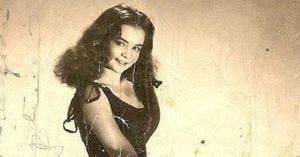The world observed International Holocaust Remembrance Day on January 27, marking the 80th anniversary of the liberation of Auschwitz-Birkenau, the site where over one million Jews and other victims lost their lives during World War II. Various events took place across Europe, with Holocaust survivors leading the reflections on this somber occasion.
At noon on January 29, the European Parliament held a special address by Corrie Hermann at its plenary session in Brussels as part of its commemoration of International Holocaust Remembrance Day. This poignant event was opened by European Parliament President Roberta Metsola and accompanied by performances of Pál Hermann's compositions, enhancing the emotional resonance of the moment. Corrie Hermann shared the tragic story of her father, Pál Hermann, a talented cellist and composer murdered by the Nazis at the age of 42. Corrie, now 92, is the custodian of her father's artistic legacy and ensured his story does not fade from collective memory.
Born on March 27, 1902, in Budapest, Pál Hermann was regarded as one of the finest cellists of his time, having studied under Béla Bartók and performed across Europe with his Gagliano cello. After fleeing to Belgium and France, he was apprehended by the Nazis and sent to his death. Before his capture, Hermann managed to throw a note from the train requesting someone save his beloved instrument. Miraculously, his cello was rescued, only to resurface decades later during the Queen Elisabeth Competition.
Albrecht Weinberg, now 99 years old, also shared his harrowing testimony as a survivor of three concentration camps, including Auschwitz-Birkenau. From his home, he recalls the horrors of the camps, stating, "Jews were only for the gas chamber. You worked until you could work no more. Then you went to the chimney." His experience mirrors countless others who suffered unspeakable fates. Born in East Frisia, Germany, Albrecht endured forced labor at the hands of the Nazis before being transported to Auschwitz, where he lost his parents upon arrival.
On the eve of this significant anniversary, Ukrainian President Volodymyr Zelenskyy participated in memorial ceremonies at the Babyn Yar National Historical and Memorial Reserve, paying tribute to the victims of the Holocaust. This event brought together members of the Ukrainian government, diplomatic representatives, and religious leaders, emphasizing the importance of remembrance amid rising global antisemitism.
Jewish groups around the world have expressed alarm over the resurgence of antisemitism. According to Sigmount Königsberg, commissioner for antisemitism issues in Berlin, there is growing insecurity among Jewish communities. He noted, "There are no longer any Jewish events, not even a Jewish puppet theatre for children, which are not protected by the police." His comments reflect rising fears and incidents of antisemitic attacks, which have reached record highs according to the German Interior Ministry.
A survey by the Anti-Defamation League revealed alarming statistics, indicating significant antisemitic views among adults globally, with 46% acknowledging harmful prejudices. Königsberg remarked on the troubling alliance between various political factions, stating, "Political groups otherwise opposed unite in their antisemitism, happening here with intensity we have never experienced before." He urges for heightened societal responsibility to confront and counteract such painful legacies.
Highlighting the role of social media, Königsberg pointed out how unchecked hate speech can proliferate, especially following limited fact-checking efforts on platforms. He believes this amplifies antisemitic narratives, requiring multi-faceted strategies involving education, media reform, and vigilance against misleading information.
For this year’s commemoration, thousands, including numerous Holocaust survivors, gathered in Poland to honor the victims of Auschwitz. Educational initiatives featuring survivor accounts are becoming more common, as individuals like 92-year-old survivor, Ingrid Geissler, share their experiences to enlighten younger generations on the horrors of the past.
The 80th anniversary of Auschwitz's liberation serves as both remembrance and instruction, reminding today’s society of the past tragedies and the imperative to confront hatred wherever it exists. Gathering at memorial sites and sharing survivor testimonies ensures those lost are not forgotten, allowing their painful experiences to inform and educate future generations.



